Table of Contents
Get started with MyPerfectResume today!
- Build a resume on any device
- Pick an ATS-friendly template
- Tailor with AI copy suggestions
Why this resume works
- Quantifies accomplishments: The applicant’s achievements, like reducing disease spread by 25%, effectively showcase their impact and value.
- Highlights industry-specific skills: Healthcare skills such as outbreak investigation and health policy align with sector-specific needs, highlighting the applicant’s fit for roles requiring specialized expertise in healthcare.
- Showcases career progression: Progressing from monitoring disease spread to analyzing outbreak trends illustrates a clear career growth trajectory, emphasizing increasing responsibility and expertise over time.
More Epidemiologist Resume Examples
Take a look at our epidemiologist resume examples to see the best ways to highlight your analytical, research, and communication skills. These science resume samples will guide you in crafting a resume that showcases your expertise in disease prevention and public health.
Entry-Level Epidemiologist
Why this resume works
- Centers on academic background: The education section paints a vivid picture of the applicant’s scholarly journey, showcasing a master’s in public health that set a solid foundation for their career.
- Effective use of keywords: Strategic use of keywords like “disease surveillance” and “public health reporting” improves the resume’s visibility to applicant tracking systems (ATS), ensuring relevant skills catch attention.
- Puts skills at the forefront: By adopting a skills-based resume format, the applicant cleverly prioritizes key abilities such as data analysis and outbreak investigation to captivate entry-level opportunities.
Mid-Level Epidemiologist
Why this resume works
- Points to measurable outcomes: By implementing strategies that reduced infection rates by 30%, the applicant evidences a clear impact on public health outcomes.
- Demonstrates language abilities: Language skills in Spanish and French improves cross-cultural collaboration and supports international research efforts.
- Displays technical expertise: Holding certifications from reputable organizations like the CDC showcases specialized knowledge in advanced statistical methods and epidemiological practices.
Experienced Epidemiologist
Why this resume works
- Focuses on work history: By organizing their career history in a chronological resume, the applicant effectively outlines extensive roles from epidemiologist to disease surveillance officer, showcasing a solid foundation in public health.
- Lists relevant certifications: Certifications like Certified Epidemiologist from the American College of Epidemiology highlight the applicant’s dedication to professional growth and expertise.
- Emphasizes leadership skills: Managing a team of researchers and leading city-wide health initiatives showcase leadership skills, demonstrating the applicant’s capacity to inspire effective project execution.
Epidemiologist Resume Template (Text Version)
Sophia Singh
Riverview, FL 33586
(555)555-5555
Sophia.Singh@example.com
Professional Summary
Experienced epidemiologist with a strong background in disease surveillance, public health research, and data analysis. Proven track record of improving health policy and outbreak response times through innovative methodologies. Dedicated to advancing epidemiological studies and enhancing public health.
Work History
Epidemiologist
Wellbeing Institute – Riverview, FL
January 2024 – August 2025
- Analyzed outbreak trends, reducing disease spread by 25%
- Designed health surveys, improving data accuracy by 40%
- Collaborated with health agencies, enhancing response time
Public Health Researcher
Health Solutions Inc. – Miami, FL
January 2022 – December 2023
- Investigated population health trends, boosting findings reliability
- Conducted field studies, decreasing errors by 15%
- Published peer-reviewed papers, aiding policy amendments
Disease Surveillance Analyst
Global Health Group – Riverview, FL
January 2021 – December 2021
- Monitored disease spread, improving detection rates by 30%
- Implemented data analytics, shortening report times
- Trained staff, increasing efficiency by 20%
Skills
- Data Analysis
- Disease Surveillance
- Public Health Research
- Biostatistics
- Field Studies
- Health Policy
- Outbreak Investigation
- Survey Design
Certifications
- Certified Epidemiologist – Association of Public Health Laboratories
- Health Data Analytics – Global Health Alliance
- Infectious Disease Specialist – International Society for Infectious Diseases
Education
Master of Public Health Epidemiology
Harvard University Cambridge, Massachusetts
May 2020
Bachelor of Science Biology
University of California, Berkeley Berkeley, California
May 2018
Languages
- Spanish – Beginner (A1)
- French – Beginner (A1)
- German – Beginner (A1)
Related Resume Guides
Advice for Writing Your Epidemiologist Resume
Dive into our advice section on how to write a resume tailored for an epidemiologist position. Discover tips that will help you highlight your expertise in disease patterns and public health research, making your resume stand out.
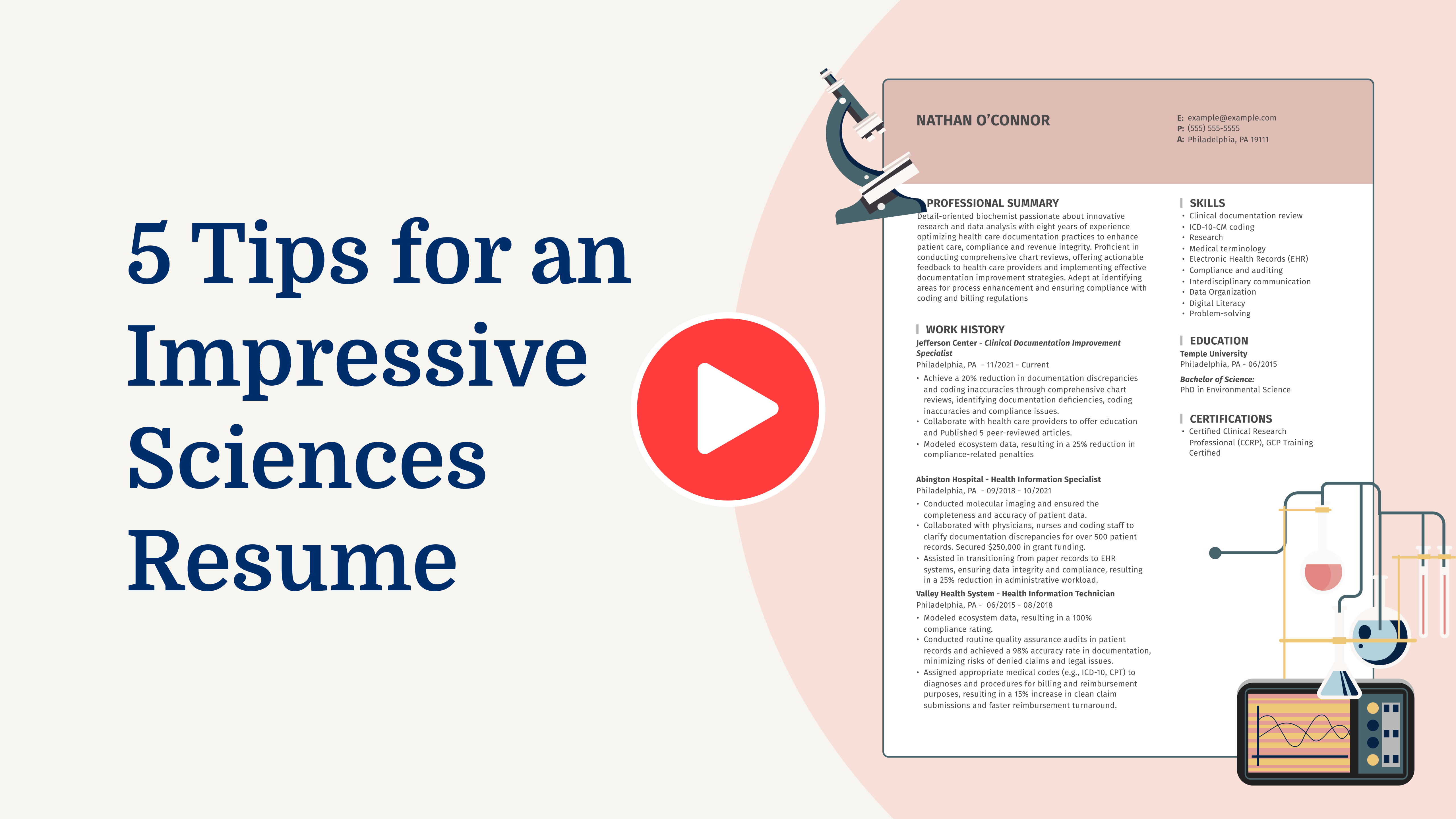
Highlight relevant technical skills
Being an epidemiologist involves employing a variety of technical skills, which are important for studying diseases and health patterns. It’s wise to feature these skills prominently on your resume, either in a dedicated section or by weaving them into your job history where relevant.
Key technical skills for an epidemiologist include expertise in data analysis and familiarity with statistical software such as SAS or R. Additionally, skill in GIS mapping tools can greatly aid in identifying trends and understanding health data more effectively. Skills like database management and bioinformatics also play a role in organizing large datasets and interpreting biological data.
When you list your technical skills, be specific about the tools or software you’re adept with. This specificity demonstrates your capability to manage the detailed tasks that epidemiologists undertake daily.
Whether you choose to highlight these abilities in their own section or incorporate them within your job descriptions, ensure they stand out so that anyone reviewing your resume immediately recognizes your readiness for the position.
Example of a technical skills section
- Statistical software (SAS, STATA, R)
- Epidemiological data analysis
- Public health surveillance systems
- Biostatistics
- Infectious disease modeling
- Geographic information systems (GIS)
- Survey design and implementation
- Data visualization tools (Tableau, Power BI)
- Systematic reviews and meta-analysis
- Database management (SQL, Access)
Employers love seeing soft skills like teamwork, communication, and adaptability because they show you can work well with others and handle challenges. Use our Resume Builder to ensure your resume shows a balanced skill set.
Quantify your accomplishments
Quantifying accomplishments on a resume makes it stand out because it shows what you have achieved rather than just listing what you did. For an epidemiologist, this means turning your job tasks into measurable successes.
For example, instead of saying “conducted research,” you could say “led a study that increased disease detection rates by 20%.” This approach lets hiring managers quickly see how effective and skilled you are.
In the work experience section, each entry should include your job title, employer name, location, and employment dates. But don’t stop there—use action verbs and metrics to describe your achievements. Did you improve data accuracy by 30%? Reduce analysis time by two weeks? These numbers show your impact clearly.
Using measurable results helps hiring managers understand your contributions at a glance. Instead of sifting through general duties, they can see specific outcomes you’ve driven. This approach not only highlights your skills but also presents you as results-oriented and capable of making significant contributions in the field of epidemiology.
5 epidemiologist work history bullet points
- Conducted epidemiological studies on disease outbreaks, leading to a 25% reduction in infection rates within targeted communities.
- Analyzed large datasets to identify health trends, resulting in the implementation of new public health strategies that increased vaccination coverage by 15%.
- Collaborated with cross-functional teams to design and execute public health interventions, improving community awareness of infectious diseases by 40%.
- Authored comprehensive reports on disease surveillance findings, contributing to policy changes that improved resource allocation for preventive measures.
- Developed predictive models using statistical software to anticipate flu season peaks, enabling healthcare facilities to better prepare and reduce patient wait times by 20%.
Need help with your resume? Check out our professional resume examples to get ideas on how to make yours shine and catch the eye of employers.
Write a powerful professional summary
A professional summary acts as a quick intro to your capabilities and potential contributions for hiring managers.
The professional summary offers a snapshot of experience, skills, and achievements in three to four sentences. It’s ideal for those with solid work experience because it showcases your professional identity and the value you bring to potential employers. By incorporating action words, you can highlight what you’ve done as an epidemiologist that sets you apart.
In contrast, the resume objective emphasizes future goals rather than past accomplishments. It’s perfect for individuals just starting out, career changers, or those returning to work after a break. While summaries express “here’s what I’ve accomplished,” objectives convey “here’s what I aim to contribute.”
Let’s explore examples of both summaries and objectives tailored for different industries and experience levels so you can see them in action!
Epidemiologist resume summary examples
Entry-level
Recent epidemiology graduate with a Bachelor of Science in public health and certification in infectious disease control. Hands-on experience through internships in data collection, analysis, and reporting. Skilled in using statistical software like SPSS and SAS to track disease patterns. Eager to contribute to public health initiatives and support research projects aimed at improving community health.
Mid-career
Epidemiologist with over seven years of experience in conducting field research and analyzing epidemiological data. Proven ability to design and implement surveillance systems for chronic diseases. Experienced in working with governmental health agencies to develop public health policies. Known for strong analytical skills, project management capabilities, and a collaborative approach to team projects.
Experienced
Senior epidemiologist with 15+ years of experience specializing in infectious disease modeling and outbreak response. Expertise in leading large-scale epidemiological studies and publishing research findings in peer-reviewed journals. Strong leadership skills demonstrated by managing multidisciplinary teams and mentoring junior staff. Committed to advancing public health through innovative research and evidence-based practices.
Epidemiologist resume objective examples
Recent graduate
Recent public health graduate with a focus in epidemiology seeking an entry-level role to contribute analytical skills and knowledge of disease prevention strategies. Committed to supporting research efforts to improve community health outcomes through data-driven solutions.
Career changer
Dedicated healthcare professional transitioning into epidemiology, bringing experience in patient care and strong data analysis skills gained through academic coursework and project work. Eager to apply expertise in identifying health trends and contributing to public health initiatives that promote equitable access to care.
Specialized training
Graduate with specialized training in biostatistics and infectious disease control looking for an opportunity to assist public health teams in monitoring disease patterns and implementing effective intervention programs. Passionate about leveraging technical skills to address pressing global health challenges.
Choose a resume template that’s clean and easy to read. Stick with basic fonts and well-organized sections for jobs, education, and skills instead of flashy designs that can bury key details.
Showcase your credentials
Listing your credentials is important for an epidemiologist because it shows that you have the special skills needed for the job. Certifications, licenses, and training show employers that you are prepared to handle technical tasks.
By creating a dedicated certifications section in your resume, you can make these achievements stand out. This section should be placed near your education section so employers can easily see all of your qualifications together.
- Certified Public Health Professional (CPH)
- Infection Prevention and Control Certification (CIC)
- Applied Epidemiology Certificate
- Field Epidemiology Training Program (FETP) Graduate
- Certified Health Data Analyst (CHDA)
Having these certifications helps demonstrate your expertise as an epidemiologist. They show that you’re ready to take on challenges in the field and contribute effectively to public health efforts. This makes you a stronger job seeker for job opportunities.
Example of a certifications section
Certified in Public Health (CPH)
Issued by: National Board of Public Health Examiners (NBPHE)
Issued 2021
Infection Control Certification (CIC)
Issued by: Certification Board of Infection Control and Epidemiology, Inc. (CBIC)
Expires 2025
Fundamentals of Epidemiology Certificate
Issued by: Johns Hopkins Bloomberg School of Public Health
Issued 2020
Advanced Biostatistics Certification
Issued by: American Statistical Association (ASA)
Expires 2026
Global Health Certificate
Issued by: Harvard T.H. Chan School of Public Health
Issued 2019
Use our ATS Resume Checker to spot over 30 common errors and quickly fix those issues with our improvement suggestions.
Salary Insights for Epidemiologists
Thinking about your job path? Salary info can show you how much money you might earn and what trends to watch in the job market. Keep reading for more details.
Top 10 highest-paying states for epidemiologists
Epidemiologists earn varying salaries across the United States, with a national average of $95,172. The table below highlights the states where epidemiologists command the highest compensation.
Our salary information comes from the U.S. Bureau of Labor Statistics’ Occupational Employment and Wage Statistics survey. This official government data provides the most comprehensive and reliable salary information for epidemiologists across all 50 states and the District of Columbia. The figures presented here reflect the May 2025 dataset, which is the most recent available as of this publication.
| State | Average Salary |
|---|---|
| New Jersey | $136,600 |
| California | $134,880 |
| South Carolina | $130,690 |
| Massachusetts | $129,060 |
| Maine | $127,100 |
| Florida | $126,760 |
| District of Columbia | $126,950 |
| Alaska | $124,500 |
| Connecticut | $124,820 |
| Rhode Island | $124,150 |
FAQ
Do I need to include a cover letter with my epidemiologist resume?
Yes, including a cover letter with your epidemiologist resume is highly recommended.
A cover letter allows you to highlight your specific interest in the position and organization, as well as elaborate on your relevant research and public health experience.
For instance, if the organization focuses on infectious disease control or chronic disease prevention, you can detail your related projects or studies in these areas.
Consider using a Cover Letter Generator to create a tailored cover letter that complements your resume by offering step-by-step guidance and expert content suggestions.
Additionally, reviewing various cover letter examples can provide inspiration and help you craft a compelling narrative that highlights your unique qualifications for the epidemiologist role.
How long should a epidemiologist’s resume be?
For an epidemiologist, a one-page resume might suffice if you’re early in your career or applying for entry-level positions. This format allows focus on essential skills like data analysis, public health knowledge, and relevant research projects.
However, a two-page resume is often appropriate for those with extensive experience or specialized certifications in the field. It provides space to detail significant studies you’ve worked on, publications, and advanced methodologies employed in your research.
Explore our guide on how long a resume should be to find examples and tips tailored to different career stages and experiences.
How do you write a epidemiologist resume with no experience?
Creating an resume with no experience when you’re starting out as an epidemiologist can be challenging. However, by emphasizing your education, skills, and relevant projects, you can make a strong impression with a compelling entry-level resume. Follow these tips:
- Emphasize your education: Start by listing your degree in public health or a related field. Include the name of the institution, graduation date, and any honors or relevant coursework that aligns with epidemiology.
- Highlight academic projects or research: If you’ve participated in research projects or case studies during your education, detail these experiences. Focus on methodologies used, data analysis techniques applied, and outcomes achieved.
- Showcase relevant skills: Epidemiology requires specific skills like statistical software skill (e.g., SPSS, SAS), analytical thinking, and communication abilities. List these skills prominently to demonstrate your readiness for the role.
Rate this article
Epidemiologist
Share this page
Additional Resources

The Illusion of Wage Growth: Where Paychecks Stretch the Farthest
U.S. wages have climbed at one of the fastest rates in modern history. Between 2020 and 2024, the average American worker’s pay rose from about $64,000 to $75,600, an 18%
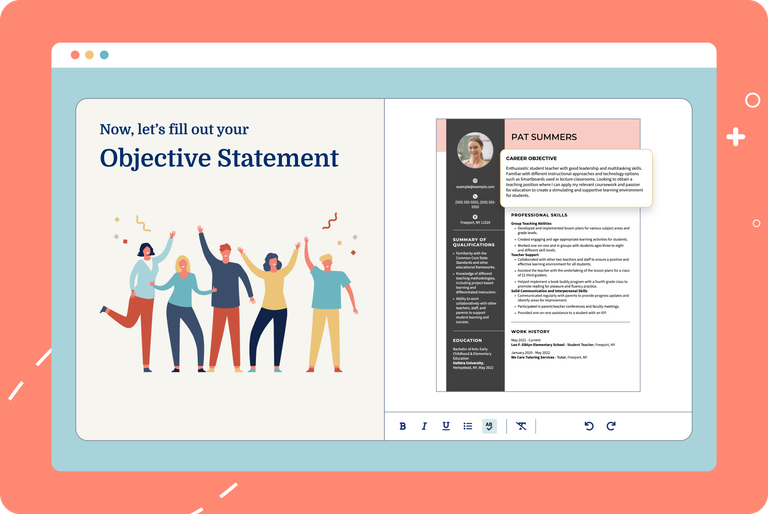
100+ Resume Objective Statement Examples & Best Practices
In just a sentence or two, a resume objective statement tells hiring managers the role or career path you’re aiming for and the unique skills and value you bring to

150+ Skills for a Resume: Examples for Any Job
Crafting a standout resume starts with highlighting the skills and qualifications that demonstrate your fit for the role. But in a crowded job market, knowing which abilities will actually catch
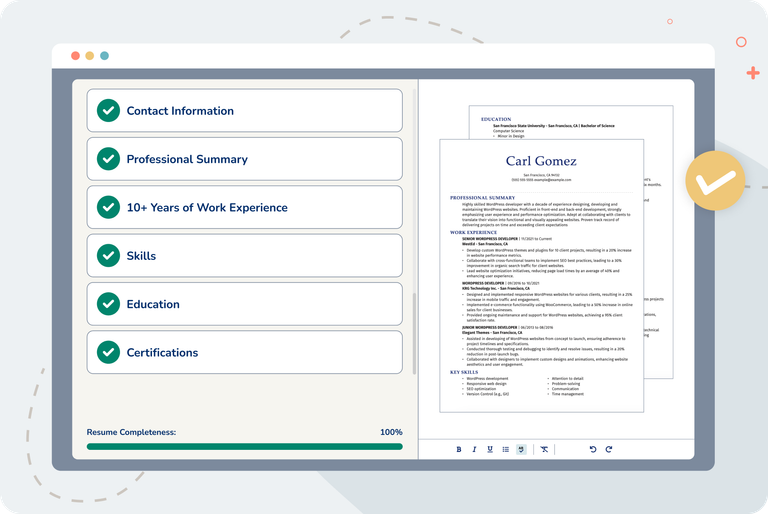
When to Use a Two Page Resume (With Examples & Formatting Tips)
If you’ve spent years building your skills, growing in your career, and racking up accomplishments, a one-page resume might not cut it. A two-page resume gives you space to present a
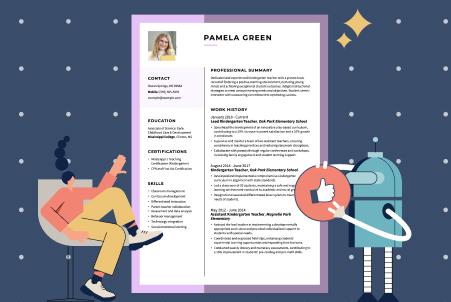
How to Make an ATS Friendly Resume (Templates & Guide)
In today’s fast-paced hiring climate, many employers use applicant tracking systems (ATS) to organize, store, and screen candidate information. Optimizing your resume for ATS is essential for ensuring your application passes
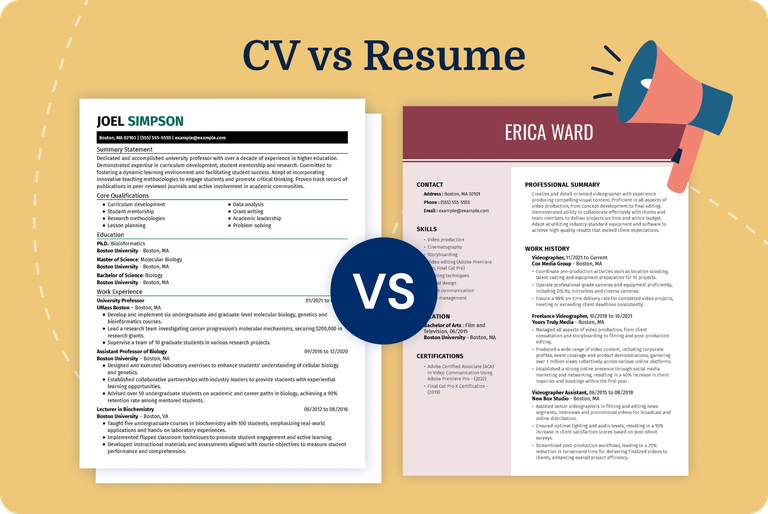
CV vs Resume: What’s The Difference?
Confused about the difference between a resume and a CV? You’re not alone! While both documents help you land a job, they vary in content, structure, and formatting. In this guide, we’ll
